Old Testament
Genesis Exodus Leviticus Numbers Deuteronomy Joshua Judges Ruth 1 Samuel 2 Samuel 1 Kings 2 Kings 1 Chronicles 2 Chronicles Ezra Nehemiah Esther Job Psalms Proverbs Ecclesiastes Song of Solomon Isaiah Jeremiah Lamentations Ezekiel Daniel Hosea Joel Amos Obadiah Jonah Micah Nahum Habakkuk Zephaniah Haggai Zechariah MalachiEcclesiastes 4:13 Meaning
What is the meaning of Ecclesiastes 4:13?
Better is a poor and a wise child than an old and foolish king, who will no more be admonished.
Ecclesiastes 4:13 Bible Verse Meaning
Ecclesiastes 4:13 - Introduction
Ecclesiastes 4:13 states: "Better is a poor and a wise child than an old and foolish king, who will no more be admonished." This verse contrasts the value of wisdom against the backdrop of age and authority, emphasizing that true wisdom is of greater worth than social status or age.
Bible Verse Meaning
This verse serves as a poignant reflection on the nature of wisdom and folly. It posits that a poor child with wisdom is preferable to an old king who lacks discernment. The emphasis on the child indicates that wisdom is not a mere product of experience or age, but rather a quality that can be found in anyone, regardless of their material circumstances.
Bible Verse Interpretations
- Matthew Henry's Commentary: Henry highlights that wisdom is invaluable and is a greater asset than wealth or authority. He draws attention to the fact that wisdom is approachable and often found in the least expected places.
- Albert Barnes' Notes: Barnes interprets the mention of a 'poor and wise child' as underscoring the idea that wisdom brings worth that surpasses riches and power, positioning the wise child as a model of discernment and refuge.
- Adam Clarke's Commentary: Clarke notes that the 'old and foolish king' symbolizes those who have failed to heed wise counsel, despite the experience expected from their position. He emphasizes the futility of power when accompanied by folly.
Bible Verse Understanding
Understanding Ecclesiastes 4:13 involves recognizing that wisdom equates to insight and understanding. Unlike wealth or power, wisdom transcends social barriers and is not contingent upon one’s background or status. This verse invites readers to seek wisdom and value it above other earthly gains.
Bible Verse Explanation
The Apostle's intent in this verse is to present a stark contrast between wisdom and folly. The 'poor and wise child' signifies the hope and potential found in youth coupled with insight, whereas the 'old and foolish king' illustrates the limitations imposed by ignorance, even with age and rank. This highlights a recurring theme in Ecclesiastes— the futility of human wisdom apart from the fear of God.
Bible Study Insights
When studying Ecclesiastes 4:13, it's enlightening to contextualize this verse within the entirety of Scripture. It harmonizes with themes present in Proverbs, where the sage discourse often elevates wisdom as supremely valuable. Engaging with this verse also fosters meaningful discussions within bible study groups, promoting the exploration of what it truly means to be wise in a world preoccupied with wealth and status.
Significance of Wisdom in Scripture
- Wisdom is a gift from God (James 1:5).
- The pursuit of wisdom is more profitable than gold (Proverbs 3:14-15).
- Folly leads to destruction, while wisdom leads to life (Proverbs 10:21).
Related Bible Cross References
- Proverbs 4:7 - "Wisdom is the principal thing; therefore get wisdom."
- James 1:5 - "If any of you lack wisdom, let him ask of God, that giveth to all men liberally."
- Proverbs 21:16 - "The man that wandereth out of the way of understanding shall remain in the congregation of the dead."
Conclusion
In summary, Ecclesiastes 4:13 challenges readers to redefine their understandings of value, prompting important reflections on the essence of wisdom versus the superficial allure of power and age. Through diligent bible study, believers can glean deeper insights, empowering them to apply biblical principles in their daily lives. Recognizing the emphasis on wisdom in this verse encourages individuals to seek understanding and to draw insights from both the challenges and teachings throughout Scripture.


